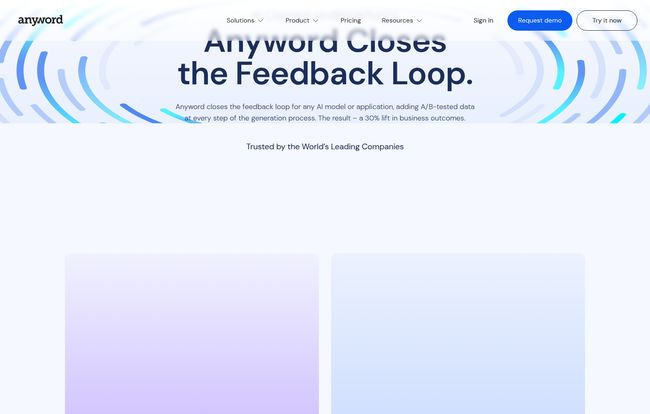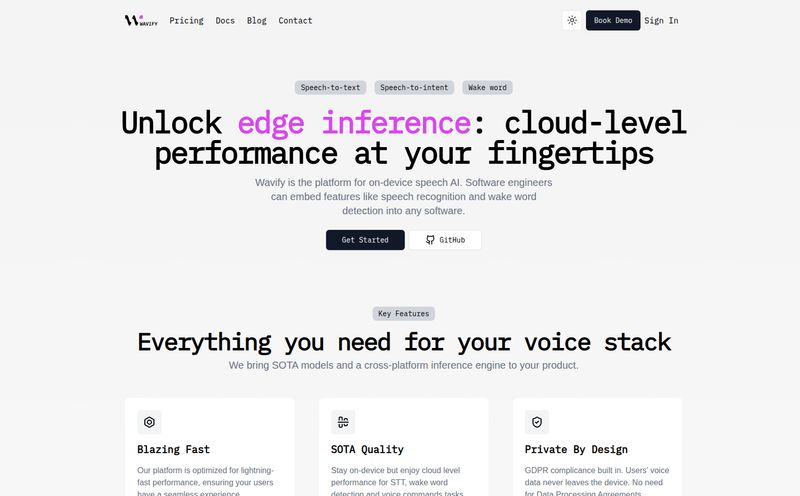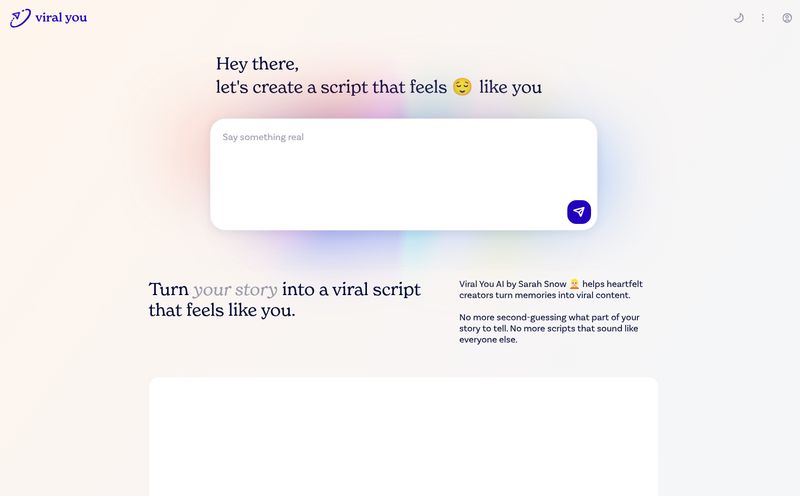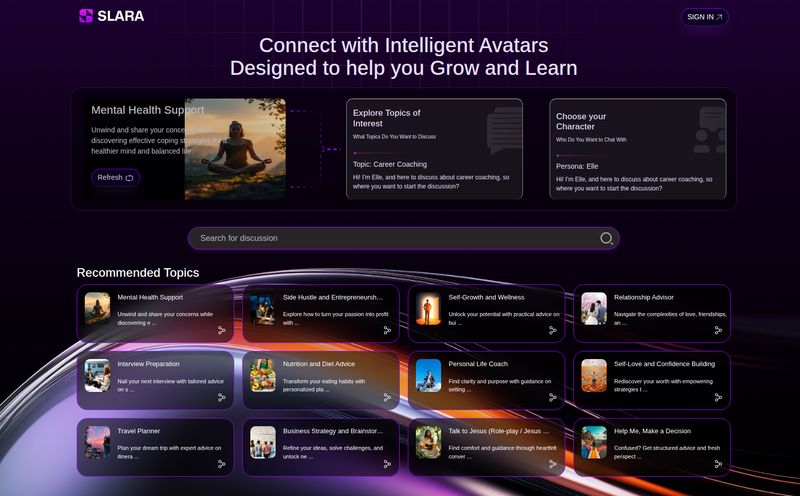As someone who's been wrestling with SEO, CPC, and the whole traffic generation beast for years, I've seen a lot of tools come and go. Especially now, with the absolute tidal wave of AI writers, it feels like a new one pops up every Tuesday. Most of them do the same thing: they spit out grammatically correct, SEO-friendly, and utterly soulless content.
You know the kind. The blog posts that read like a Wikipedia entry had a baby with a thesaurus. They check the boxes, but they don't connect. They don't persuade. They just... exist.
So when I started hearing the buzz about a tool called Anyword, I was skeptical. Another AI promising the world? But the hook was different. It wasn't just about creating content; it was about creating content that performs. That's a whole different ball game. It’s not just about filling a page; it’s about making that page work for you. And for a performance marketer, that’s music to my ears.
What Exactly is Anyword, and Why Should I Care?
At its heart, Anyword is an AI writing assistant, but that's like calling a Ferrari 'a car'. It misses the point. Where most AI tools stop at generation, Anyword keeps going. It integrates performance data directly into the creative process. Think of it as an AI copywriter with a seasoned marketing director whispering in its ear.
It's built on a simple but powerful idea: what if you could predict how well your copy would do before you even publish it? What if you could A/B test headlines without, you know, actually running a full-blown A/B test? That’s the promise here. It analyzes mountains of data to give your copy a predictive performance score, telling you which variations are most likely to get you those precious clicks and conversions.
For me, this is the magic. It’s about closing the feedback loop between creation and results. No more throwing spaghetti at the wall to see what sticks. This is more like having a spaghetti-launching cannon with a laser sight.
The Features That Actually Matter to Marketers
I've clicked through more feature lists than I can count. Most are just fluff. With Anyword, a few things really stood out to me as genuinely useful for people in the trenches.
The Predictive Performance Score: A Crystal Ball for Your Copy?
This is the main event. As you generate copy—whether it's for an ad, a landing page, or an email subject line—Anyword gives it a score. This isn't just a random number; it’s a grade based on how similar copy has performed in the past. It even breaks it down by demographics. Maybe a certain headline rocks with younger audiences but falls flat with older ones. Anyword can tell you that. It’s like having a focus group on standby, 24/7. It settles those internal debates where one person feels a headline is stronger, but another disagrees. Now, you have data. Not a gut feeling.
Finally, an AI That Understands Your Brand Voice
This is my biggest pet peeve with AI writers. They are chronically, painfully generic. Getting them to match a specific brand voice can feel like trying to teach a cat to file taxes. It's a nightmare. Anyword tackles this head-on. You can create specific 'Brand Voices' by feeding it examples of your best-performing content. The AI learns your style, your tone, your no-go words, and your key messaging. Then, it generates new copy that actually sounds like it came from you, not a robot. Maintaining brand consistency across dozens of channels just got a whole lot easier.
More Than Just Words: The Blog Wizard and Other Tools
While the performance scores are flashy, the day-to-day content production tools are solid. The Blog Wizard is a standout. It helps you structure a full-length article, from outline to finished draft, complete with a plagiarism checker. It streamlines the whole process, cutting down the time it takes to get from a blank page to a published post. And its got templates for everything you can think of—social media posts, product descriptions, email campaigns. It’s a real workhorse.

Visit Anyword
Okay, But Who Is This Really For?
Anyword isn't a one-size-fits-all solution, and its pricing reflects that. I see it fitting a few key groups:
- Solo Marketers & Freelancers: If you're a one-person show juggling multiple clients or projects, the Starter plan is a godsend. It automates the grunt work of copywriting and gives you a data-backed edge to impress clients.
- In-House Marketing Teams: The Data-Driven and Business plans are built for you. The ability to have multiple seats, more performance predictions, and, crucially, the ability to train the AI on your own past campaign data is huge. It turns Anyword from a smart tool into a bespoke content engine for your brand.
- Large Enterprises: For the big players, the Enterprise plan offers things like enterprise-grade security, private language models (LLMs), and full API access. This is for organizations where brand control, security, and scalability are non-negotiable.
Let's Talk Money: A Breakdown of Anyword's Pricing
Alright, the all-important question: what's this going to cost? The pricing is tiered, and honestly, it’s positioned as a premium tool. It’s not the cheapest on the market, but it’s not trying to be. It’s selling results, not just words.
The Starter plan begins at $49 per month. This gets you one seat, unlimited copy generation, and 50 performance predictions. It's a solid entry point for freelancers or small business owners who want to dip their toes in data-driven copywriting.
Next up is the Data-Driven plan at $99 per month. This is where it gets interesting for small teams, bumping you up to 3 seats and 100 performance predictions. A key feature here is the real-time prediction for manual edits, which is super helpful.
For larger teams serious about performance, the Business plan comes in at $499 per month. It sounds steep, but here's where you can connect your own ad accounts and marketing channels to train the AI on your historical data. You get custom-built AI models, automated A/B testing for your website, and priority support. This is for teams who live and die by their metrics.
Finally, there's a custom-priced Enterprise plan for large-scale operations needing maximum security, control, and custom integrations.
My Honest Take: The Good, The Bad, and The... AI-y
So, what’s the verdict? I'm genuinely impressed. The focus on performance isn't just marketing fluff; it's baked into the product's DNA. The ability to maintain a consistent brand voice is a massive problem-solver. And for teams, being able to train the AI on your own winning campaigns is a potential game-changer. It streamlines content production in a way that actually adds value beyond just speed.
But it's not perfect. For a freelancer just starting out, the price tag might be a bit of a hurdle. There’s also a bit of a learning curve. This isn’t a simple prompt-and-go tool; to get the most out of it, you need to invest time in setting up your brand voice and understanding how the performance scores work. And there's always the danger of becoming too reliant on the AI, letting the data completely overshadow creative instinct. You still need a human touch to guide it, to know when to break the rules the data suggests.
Frequently Asked Questions About Anyword
1. Does Anyword write entire blog posts?
Yes, it does. The 'Blog Wizard' feature guides you through creating a full-length, SEO-friendly article, from generating an outline based on your keyword to writing the content for each section and checking for plagiarism.
2. What are 'performance predictions' really?
It's a scoring system that predicts how likely a piece of copy is to engage your audience. Anyword analyzes vast amounts of marketing data and uses that to grade your text, even predicting how different demographics might react to it. It’s a data-driven forecast of your copy's potential success.
3. Can I really train Anyword on my own brand?
Absolutely. Higher-tier plans allow you to create 'Brand Voices' by providing examples of your existing copy. The Business and Enterprise plans take this further, letting you connect your marketing channels (like Facebook Ads or Google Ads) to let the AI learn directly from your most successful past campaigns.
4. Is Anyword worth the cost compared to cheaper AI writers?
In my opinion, it depends on your goals. If you just need to churn out simple content, a cheaper tool might suffice. But if your job depends on driving conversions, improving click-through rates, and proving ROI, then Anyword's performance-focused features could easily pay for themselves.
5. How many users can use one Anyword account?
The Starter plan is for one user (1 seat). The Data-Driven and Business plans include 3 seats, and the Enterprise plan offers custom seat numbers to fit your organization's needs.
So, Is Anyword the Future of Performance Copywriting?
Look, calling anything 'the future' is a bold claim. But Anyword is making a hell of an argument. It's one of the first AI tools I've seen that truly understands what marketers actually do. We don't just write; we test, we analyze, we optimize. Anyword builds that entire workflow into a single platform.
It’s a powerful ally for anyone tired of the content creation hamster wheel, for anyone who needs to justify their creative choices with hard data. It's not a magic bullet—you still need strategy and a human brain—but it might just be the smartest, most data-savvy assistant a marketer could ask for right now.



